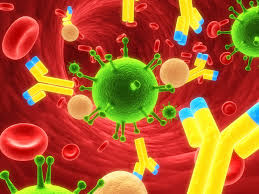8W330 - Immunology and Infection
Infectious diseases and disorders of immunity are a continuous threat to the life and well-being of humans. Studying the fundamental processes in immunology, such as recognition of antigen, development of mature lymphocyte receptor repertoires, and the adaptive immune response is crucial for understanding how the human body deals with the daily invasion of micro-organisms. Infectious disease-oriented problems related to function and biology of microorganisms, molecular epidemiology of infections, microbial virulence and therapy resistance, interactions between host and microorganisms, inflammation and tissue damage are therefore important subjects of the first part of the course.
The second part of the course deals with clinical immunology, thus diseases, where the immune system is either not (entirely) functional or deregulated. Well-known examples are hypersensitivities e.g. allergy, auto-immune diseases and immune deficiencies like AIDS. Furthermore, the role of the immune system in transplantations and in malignancies is discussed, as well as immunotherapy against cancer and vaccination-strategies. This course is part of a collection of "pre-medical" minor courses intended to prepare students who intend to pursue medical studies at the MSc level. It is reccomended to take this subject in preparation of the entrance exam of the Selective Utrecht Medical Masters (SUMMA) at Utrecht University.
Learning objectives
The aim of this course is to deepen the understanding of the human immune system and basic bacteriology and virology and to bring the students to the level that they understand recent primary research papers such that they are able to judge the validity of arguments and conclusions in these papers.
